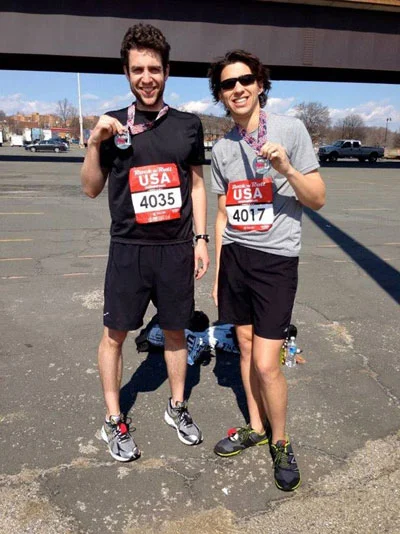by Editorial Staff | October 3, 2016
- Asthma
Fall marathon season is upon us, and here at the Lung Association, we are inspired by the growing number of Americans who run marathons each year. While completing a marathon is a difficult feat for anyone, it can be especially challenging for those who suffer from a chronic respiratory disease.
To learn more about what it's like to run marathons as an individual who struggles with a respiratory issue, we spoke with Jeremy Deaton, an avid runner living and running with asthma. Jeremy recently moved to New York City from Washington, D.C.
Question: When did you first start suffering from asthma? How does it affect you in your daily life now?
Answer from Jeremy: I was diagnosed with asthma when I was 10. It was very manageable at that age. For a geeky kid who was bad at sports, asthma wasn't much of a burden for me then. But, it got worse as I grew older. My asthma worsened significantly about a year after I moved to Washington, D.C., in my late 20s. I am not sure if it was my age or a greater sensitivity to local allergens that prompted the change. While I can keep my asthma under control at home or at the office, running leads to wheezing and shortness of breath. Working with my allergist to develop a treatment plan has been crucial to enjoying a high quality of life.
Q: How long have you been running? How long have you been running marathons?
A: I started running in my late 20s after reading "Born to Run" by Christopher McDougall. He describes people running 50 or 100 miles at a time in a state of total bliss. It was profoundly inspiring. I started running marathons right away. I have completed seven so far.
Q: How has your asthma affected your running and marathon training?
A: It's a nuisance when it comes to training. You have to think about managing your asthma—when to use what medication and how much. You constantly wonder how your condition is affecting your performance. Occasionally, it can be disastrous.
I ran the Charlottesville Marathon a couple of years ago — sort of. I ran the first 16 miles, but my asthma caught up with me. It was the beginning of allergy season. The trees were starting to bloom. I used my rescue inhaler at every mile, but to no avail. I had to walk the last 10 miles of the race. It was deeply disappointing to train so hard and perform so poorly.
Q: Yikes! That does sound extremely disappointing. I am very impressed by your drive to finish that race, but I will say that we recommend that people who are experiencing asthma symptoms during physical activity should stop, take their medication and rest. What strategies have you found to be the most effective when it comes to controlling your asthma?
Do you know the steps to take when you start to have symptoms? Create a plan with your healthcare provider. Download a free Asthma Action Plan today.
A: I take a steroid inhaler twice a day and, depending on the season, several over-the-counter allergy medications. I always use my rescue inhaler before I run. For runs longer than 45 minutes, I take it with me.
Q: What running-specific strategies/steps do you use in addition to the steps you already have to take every day as an individual with asthma?
I avoid running near streets and highways. I also like to run first thing in the morning when pollution levels are lowest. During allergy season, I sometimes use the treadmill for shorter, slower runs. As a result of climate change, allergy season has become longer and more severe. I worry how carbon pollution will shape allergy seasons in the years to come.
Q: Do you have any marathons coming up?
A: I plan to run the Brooklyn Marathon in November.
Q: What advice would you give to new runners with asthma?
A: Seek the help of a qualified allergist or pulmonologist. Get the treatment you need to be able to get outside and run around.
The American Lung Association encourages people living with a chronic lung disease, such as asthma, to make exercise a part of their daily routine. Physical activity is an important for lung health and working in partnership with a healthcare provider can help you stay active and healthy.
Blog last updated: August 30, 2023



